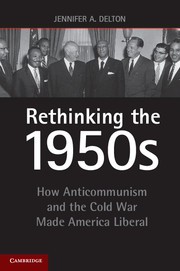5 - Civil Rights
Published online by Cambridge University Press: 05 October 2013
Summary
Far from quelling the civil rights movement, the Cold War provided persuasive justification for its demands. Even more than the Second World War, the Cold War spotlighted the shortcomings of the United States as a democracy. How could the United States be a credible representative of democracy abroad when it upheld a system of white supremacy at home? Government officials, corporate leaders, and civil rights activists alike pointed to Cold War competition with the Soviet Union to explain why antidiscrimination legislation was necessary, why army bases and schools had to be integrated, and why Jim Crow had to be dismantled. Gradual progress in this area was no longer enough, intoned a 1952 article in Fortune: “In a world that is about 65 percent non-white the Communist charge of racial exploitation in American reverberates with a crashing emphasis.” Secretary of State Dean Acheson echoed this: “racial discrimination in the United States remains a source of constant embarrassment to this government in the day to day conduct of its foreign relations; and it jeopardizes the effective maintenance of our moral leadership of the free and democratic nations of the world.” Soviet propaganda and geopolitical competition in Asia and Africa would require the U.S. government to push against the states’ rights doctrine that undergirded white supremacy in the South and de facto discrimination elsewhere.
- Type
- Chapter
- Information
- Rethinking the 1950sHow Anticommunism and the Cold War Made America Liberal, pp. 96 - 120Publisher: Cambridge University PressPrint publication year: 2013



